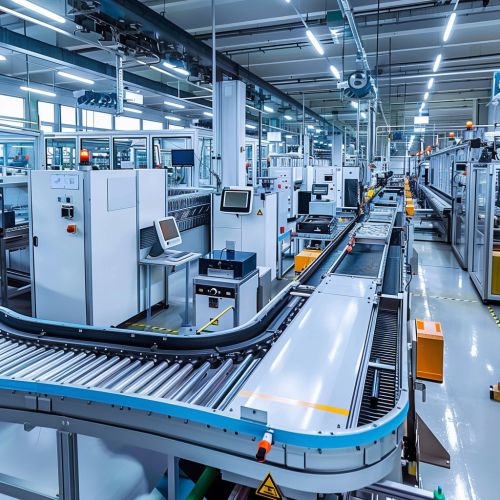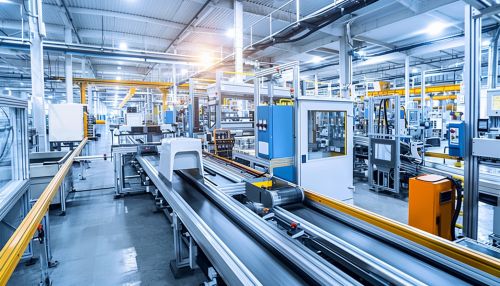Production Engineering
Overview
Production engineering is a specialized area of mechanical engineering that focuses on the design and optimization of manufacturing processes. It involves the application of principles from various engineering disciplines to improve the efficiency and productivity of industrial operations.
History
The field of production engineering emerged during the Industrial Revolution, when the need for efficient manufacturing processes became paramount. The advent of mass production methods and the development of complex machinery necessitated a new branch of engineering dedicated to optimizing these processes.
Principles of Production Engineering
Production engineering is based on several fundamental principles. These include the principles of process design, process planning, and process control.
Process Design
Process design involves the creation of manufacturing systems and processes that are efficient, cost-effective, and capable of producing high-quality products. This includes selecting the appropriate machinery and equipment, determining the sequence of operations, and designing the layout of the production facility.
Process Planning
Process planning involves determining the best way to carry out a manufacturing process, taking into consideration factors such as cost, time, and quality. This includes deciding on the type of machinery and equipment to be used, the sequence of operations, and the methods of quality control.
Process Control
Process control involves monitoring and controlling the manufacturing process to ensure that it is operating efficiently and producing high-quality products. This includes the use of statistical process control techniques, automation, and computer-aided manufacturing systems.
Applications of Production Engineering
Production engineering is applied in a wide range of industries, including automotive, aerospace, electronics, and consumer goods manufacturing. It is also used in the design and operation of manufacturing systems in the pharmaceutical, food and beverage, and chemical industries.
Automotive Industry
In the automotive industry, production engineers are involved in the design and optimization of assembly lines, the selection of manufacturing processes, and the implementation of quality control systems.
Aerospace Industry
In the aerospace industry, production engineers are responsible for the design and operation of manufacturing systems for the production of aircraft and spacecraft components. This includes the selection of materials, the design of manufacturing processes, and the implementation of quality control systems.
Electronics Industry
In the electronics industry, production engineers are involved in the design and operation of manufacturing systems for the production of electronic components and devices. This includes the selection of materials, the design of manufacturing processes, and the implementation of quality control systems.
Consumer Goods Manufacturing
In the consumer goods manufacturing industry, production engineers are responsible for the design and operation of manufacturing systems for the production of a wide range of products, from household appliances to clothing and footwear.
Future Trends in Production Engineering
The field of production engineering is constantly evolving, with new technologies and methodologies being developed to improve the efficiency and effectiveness of manufacturing processes. Some of the key trends in production engineering include the increasing use of automation and robotics, the adoption of digital manufacturing technologies, and the implementation of sustainable manufacturing practices.
Automation and Robotics
The use of automation and robotics in manufacturing processes is becoming increasingly prevalent. This includes the use of automated machinery and equipment, robotic assembly systems, and computer-aided manufacturing systems.
Digital Manufacturing
Digital manufacturing technologies, such as additive manufacturing (also known as 3D printing), are revolutionizing the field of production engineering. These technologies allow for the rapid prototyping and production of complex parts and components, reducing the time and cost of manufacturing processes.
Sustainable Manufacturing
Sustainable manufacturing practices are becoming increasingly important in the field of production engineering. This includes the use of renewable energy sources, the recycling and reuse of materials, and the implementation of energy-efficient manufacturing processes.


